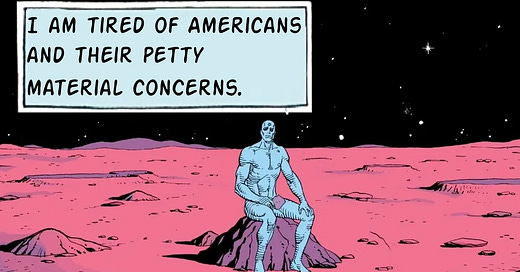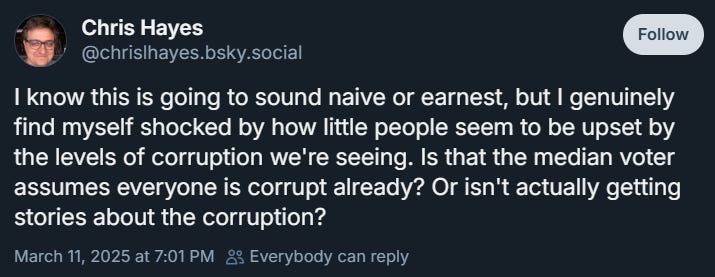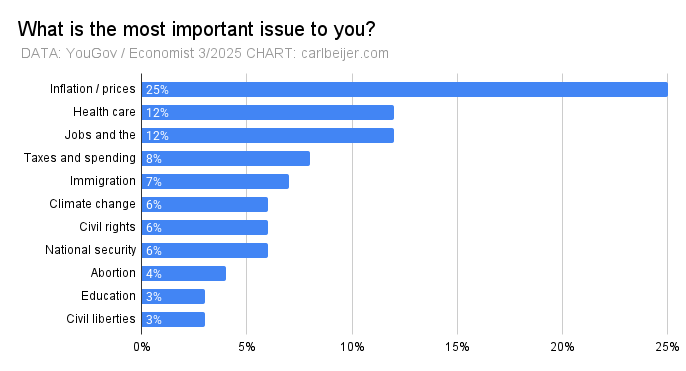Why Americans don't care about what the discourse cares about
Extremely online liberals are irritated that Americans are focused on paying the bills.
One of the funnier spectacles of the last year has been watching liberal microblogging enclave Bluesky discover, to its horror, that most Americans just don’t care about the things it cares about. Just look at this thread kicked off by MSNBC personality Chris Hayes:
Go through the mentions and you’ll find an endless parade of posters venting about their microtrauma (“it’s driving me crazy!”) and gaping at other Americans with various combinations of horror and disgust (“people I love are so misinformed”, “such inhumanity”, etc). Go through enough threads like this, and you’ll start to see the outline of a broader theme: online liberals are outraged about corruption, threats to democracy, lawlessness, and so on. And they’re also outraged — in some cases, I dare say, even more outraged — that other Americans are focused instead on the cost of living or potential cuts to welfare programs.
Though it never strays far, this discourse does extend beyond social media. Here for example is Brian Beutler explaining why Americans have their priorities backwards:
…when you can only bring yourself to fight enemies of democracy, ethics, and equality on the grounds that they destabilize the economy, you will chase data you can’t control while atrocities go unmentioned. If you ignore their moral crimes altogether, and only criticize them if the price of eggs happens to be high, who will tend the light of freedom before it flickers out?
This is a crucial premise of the discourse: Americans don’t just have different priorities, they have the wrong priorities. Brian describes food insecurity and the enormous stress of a high cost of living with vague abstractions about a “destabilized economy” and glib simplifications to “the price of eggs” because these are not what he wants Americans to focus on.
It is, again, pretty funny to see guys like Beutler fight a losing battle. Write as many condescending 5000 word blog posts about the misplaced priorities of Americans as you like — you aren’t going to get them to stop caring about their material well-being.
This is what how Americans rank their most important issues right now. It is also, more or less, how they’ve ranked them as long as I remember. It’s just an iron law of American political life, right up there with “old white Republican politicians love sex scandals” and “Elon Musk is going to embarrass himself again,” that people usually rank the economic issues as their number one concern. Maybe they are bad or stupid to do so, which is what a lot of online liberals clearly seem to think, but complaining about it is a whole lot like complaining about LeBron James getting a cheap foul call. All you’re going to do is raise your blood pressure.
That said, I do not think that prioritizing one’s material well-being over concerns about corruption and threats to democracy is either bad or stupid. It is true — as Brian puts out — that if you neglect the defense of our Constitution and the cause of liberalism in general, the light of freedom may dim. It is even possible that the flame of liberty may be extinguished. I do not want to downplay what it would mean to see the legacy of our founding fathers pass into shadow and dust because it would undoubtedly be a harrowing experience.
But here’s the thing about affordable food and welfare programs: if you lose them, you die. For hundreds of thousands of years, humans all over the world have shown a remarkable and even inspiring ability to survive without the rights and freedoms of the modern liberal state. What they have not been able to do is survive serious illness without medication. Or stay healthy without reliable access to carbohydrates. This is basic Maslow’s hierarchy shit, and contrary to what some liberals seem to think, Maslow’s hierarchy isn’t an ordering of what dumb people care about versus what wise people care about. It’s a ranking of needs.
Hayes complains that Americans aren’t also agonizing about corruption — but insofar as that is even true, it isn’t particularly mysterious. Political engagement has costs. It has basic financial costs (tuition, subscriptions); it requires time investments (to catch up on the news, to attend civic functions); it even has emotional costs (you can’t spend 5 minutes on Bluesky without hearing about the toll political consciousness is taking on everyone’s mental health). Political engagement has costs and people have limited means to pay for it. And as Down points out in his classic An Economic Theory of Democracy, this is particularly true for the poor, who have less disposable income, less free time, and less emotional bandwidth to invest in civics.
Since we all have limited means, everyone invests their time, money, and energy into politics as rationally as they can. If you are poor, for example, you probably aren’t going to invest much into politics at all because your life is full of much more urgent concerns like getting to your second job on time or finding dinner for your kids. And even if you do engage with politics, your concerns are still going to revolve around what online liberals disparagingly call “kitchen table issues”: paying the utility bills, seeing a doctor about that cough, and so on. If you are better off, your utility payments are probably being withdrawn automatically from an account that always has enough money, so instead you have the privilege of focusing on less immediate concerns. That is when you get to start wondering things like “is Elon Musk’s campaign to destroy regulatory agencies being driven by conflicts of interest that should be resolved at a systematic or procedural level?”
So there is a pretty simple explanation for why online liberal discourse is way more concerned about corruption that the general population: online liberals are relatively well-off. They don’t have to focus on egg prices or Medicaid. They can take that stuff for granted, and they have the bandwidth, won through their privilege, to focus on less immediate concerns. That’s the other thing that makes this discourse so funny: these folks really don’t seem to get how out-of-touch it is to browbeat the public for caring about their basic needs.
Thanks for reading! My blog is supported entirely by readers like you. To receive new posts and support my work, why not subscribe?
Refer enough friends to this site and you can read paywalled content for free!
And if you liked this post, why not share it?







